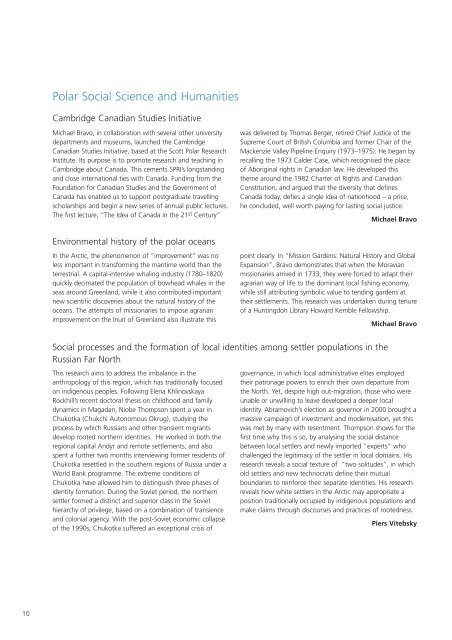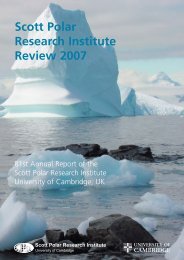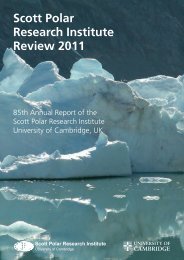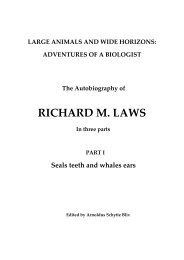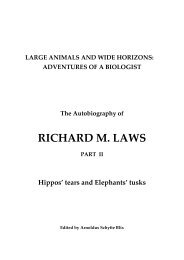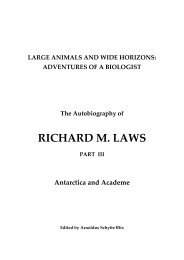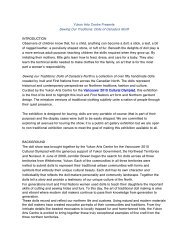Acrobat PDF version of SPRI Review 2004 - Scott Polar Research ...
Acrobat PDF version of SPRI Review 2004 - Scott Polar Research ...
Acrobat PDF version of SPRI Review 2004 - Scott Polar Research ...
Create successful ePaper yourself
Turn your PDF publications into a flip-book with our unique Google optimized e-Paper software.
<strong>Polar</strong> Social Science and Humanities<br />
Cambridge Canadian Studies Initiative<br />
Michael Bravo, in collaboration with several other university<br />
departments and museums, launched the Cambridge<br />
Canadian Studies Initiative, based at the <strong>Scott</strong> <strong>Polar</strong> <strong>Research</strong><br />
Institute. Its purpose is to promote research and teaching in<br />
Cambridge about Canada. This cements <strong>SPRI</strong>’s longstanding<br />
and close international ties with Canada. Funding from the<br />
Foundation for Canadian Studies and the Government <strong>of</strong><br />
Canada has enabled us to support postgraduate travelling<br />
scholarships and begin a new series <strong>of</strong> annual public lectures.<br />
The first lecture, “The Idea <strong>of</strong> Canada in the 21 st Century”<br />
was delivered by Thomas Berger, retired Chief Justice <strong>of</strong> the<br />
Supreme Court <strong>of</strong> British Columbia and former Chair <strong>of</strong> the<br />
Mackenzie Valley Pipeline Enquiry (1973–1975). He began by<br />
recalling the 1973 Calder Case, which recognised the place<br />
<strong>of</strong> Aboriginal rights in Canadian law. He developed this<br />
theme around the 1982 Charter <strong>of</strong> Rights and Canadian<br />
Constitution, and argued that the diversity that defines<br />
Canada today, defies a single idea <strong>of</strong> nationhood – a price,<br />
he concluded, well worth paying for lasting social justice.<br />
Michael Bravo<br />
Environmental history <strong>of</strong> the polar oceans<br />
In the Arctic, the phenomenon <strong>of</strong> “improvement” was no<br />
less important in transforming the maritime world than the<br />
terrestrial. A capital-intensive whaling industry (1780–1820)<br />
quickly decimated the population <strong>of</strong> bowhead whales in the<br />
seas around Greenland, while it also contributed important<br />
new scientific discoveries about the natural history <strong>of</strong> the<br />
oceans. The attempts <strong>of</strong> missionaries to impose agrarian<br />
improvement on the Inuit <strong>of</strong> Greenland also illustrate this<br />
point clearly. In “Mission Gardens: Natural History and Global<br />
Expansion”, Bravo demonstrates that when the Moravian<br />
missionaries arrived in 1733, they were forced to adapt their<br />
agrarian way <strong>of</strong> life to the dominant local fishing economy,<br />
while still attributing symbolic value to tending gardens at<br />
their settlements. This research was undertaken during tenure<br />
<strong>of</strong> a Huntingdon Library Howard Kemble Fellowship.<br />
Michael Bravo<br />
Social processes and the formation <strong>of</strong> local identities among settler populations in the<br />
Russian Far North<br />
This research aims to address the imbalance in the<br />
anthropology <strong>of</strong> this region, which has traditionally focused<br />
on indigenous peoples. Following Elena Khlinovskaya<br />
Rockhill’s recent doctoral thesis on childhood and family<br />
dynamics in Magadan, Niobe Thompson spent a year in<br />
Chukotka (Chukchi Autonomous Okrug), studying the<br />
process by which Russians and other transient migrants<br />
develop rooted northern identities. He worked in both the<br />
regional capital Andyr and remote settlements, and also<br />
spent a further two months interviewing former residents <strong>of</strong><br />
Chukotka resettled in the southern regions <strong>of</strong> Russia under a<br />
World Bank programme. The extreme conditions <strong>of</strong><br />
Chukotka have allowed him to distinguish three phases <strong>of</strong><br />
identity formation. During the Soviet period, the northern<br />
settler formed a distinct and superior class in the Soviet<br />
hierarchy <strong>of</strong> privilege, based on a combination <strong>of</strong> transience<br />
and colonial agency. With the post-Soviet economic collapse<br />
<strong>of</strong> the 1990s, Chukotka suffered an exceptional crisis <strong>of</strong><br />
governance, in which local administrative elites employed<br />
their patronage powers to enrich their own departure from<br />
the North. Yet, despite high out-migration, those who were<br />
unable or unwilling to leave developed a deeper local<br />
identity. Abramovich’s election as governor in 2000 brought a<br />
massive campaign <strong>of</strong> investment and modernisation, yet this<br />
was met by many with resentment. Thompson shows for the<br />
first time why this is so, by analysing the social distance<br />
between local settlers and newly imported “experts” who<br />
challenged the legitimacy <strong>of</strong> the settler in local domains. His<br />
research reveals a social texture <strong>of</strong> “two solitudes”, in which<br />
old settlers and new technocrats define their mutual<br />
boundaries to reinforce their separate identities. His research<br />
reveals how white settlers in the Arctic may appropriate a<br />
position traditionally occupied by indigenous populations and<br />
make claims through discourses and practices <strong>of</strong> rootedness.<br />
Piers Vitebsky<br />
10


